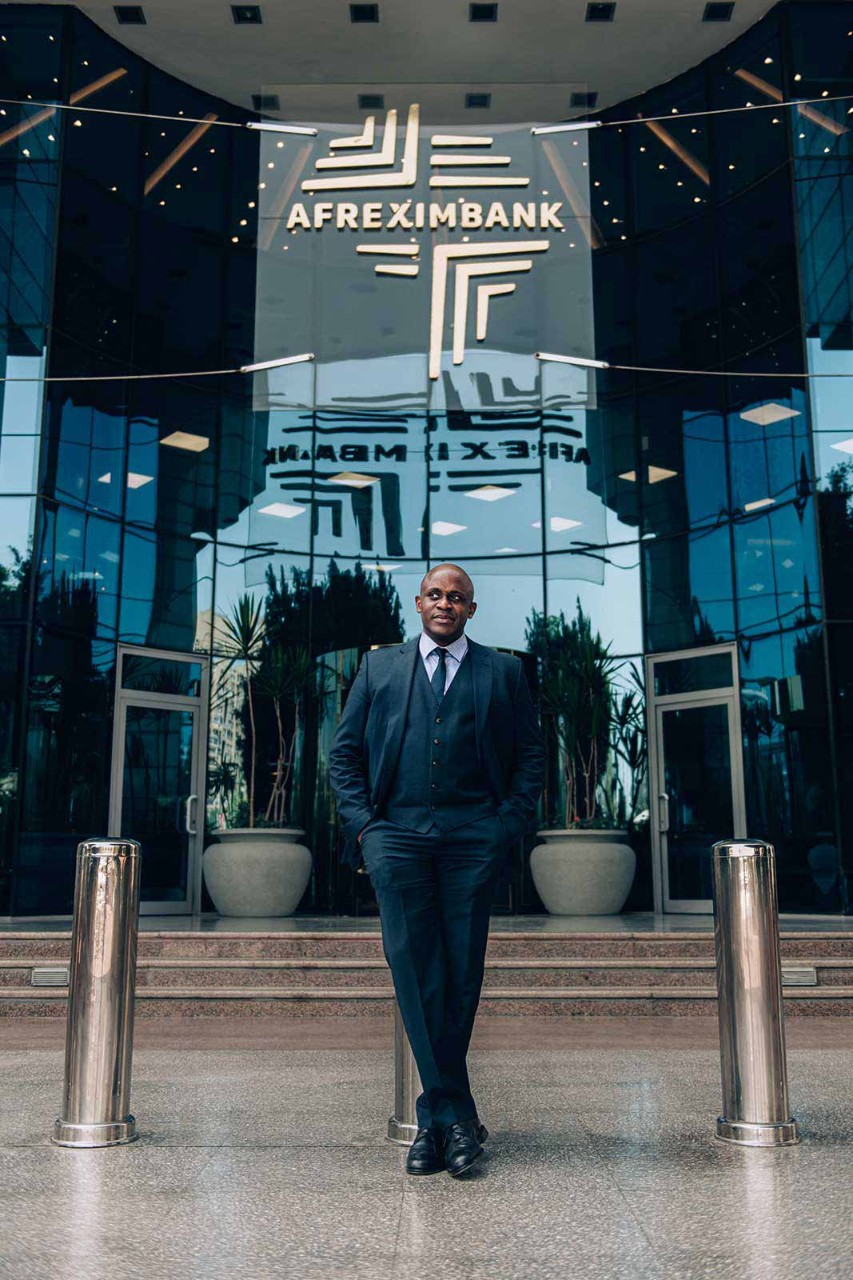
Chandi Mwenebungu FCCA will shortly be celebrating his 10th year as group treasurer of African Export-Import Bank (Afreximbank). But it is highly likely he’ll be toasting this milestone from an airport lounge. The international nature of his role involves a good deal of travel, plus his family remain in Glasgow, Scotland, where he was based before his move to the bank in Egypt’s capital Cairo.
‘We provide the financing to facilitate trade but also for trade infrastructure – anything that enables trade’
When Chandi joined the bank, which was set up in 1993 to oil the wheels of commerce within and beyond Africa, its treasury function had only just been created and was being decoupled from the wider finance function. Chandi started off with a team of just four, but he now oversees 18 treasury professionals who collectively manage the bank’s funding requirements and financial risks.
‘My role is to identify and mitigate the financial risks and funding gaps while also managing the bank’s cash and liquidity on a daily basis,’ he explains. He also looks after the bank’s credit rating process and investor relations. ‘This is a critical point,’ he says. ‘Investors can be choosy, so we constantly need to engage with them to avoid any volatility. We are transparent so that investors have visibility.’
Crisis-born
Afreximbank was born out of Africa’s 1980s debt crisis, when many international banks withdrew credit lines, de-risked and left the continent. A number of African heads of state came together in Nigeria to find a lasting solution that would support trade between African nations and further afield. The bank’s aim was simple – to ensure sufficient liquidity to keep the African wheels of commerce turning in the event of another financial crisis.
The bank is also able to support African states as they move from a closed economic system to a more open free trade regime, as embodied in projects such as the African Continental Free Trade Agreement.
CV
2013
Group treasurer and director, African Export-Import Bank, Cairo, Egypt
2012
Head of treasury investment, Inter Hannover, London
2006
European treasurer and investments manager, Cigna, Glasgow
2002
Portfolio accountant, Deyoma, London, UK
1998
Treasury officer, Nedbank, Malawi
Chandi describes the bank as a public/private institution. It has four classes of shareholder, ranging from a number of African states (which collectively own 65% of the bank) to non-sovereign institutions, international partners and even retail investors. The bank uses the capital it raises through instruments such as bonds to provide trade finance for companies seeking to do business in Africa and elsewhere, and to fund the infrastructure that supports this trade.
‘We provide the financing and the insurance to facilitate trade, but we also provide the finance for trade infrastructure,’ he explains. ‘Anything that enables trade.’
‘I learnt to be patient, to work hard and be organised, but also that the sky really is the limit’

UK-bound
Chandi has spent much of his career in treasury. While living in Botswana, he studied for an AAT qualification at the Malawi College of Accountants on the advice of a financial controller he met, and then proceeded to train for his ACCA Qualification while working with Nedbank in Malawi as a treasury officer. Having opted to study the UK qualification, he moved to London to finish his studies while working part time for an accounts bureau.
His next move took him to Glasgow. After a brief spell with recruitment consultancy Reed Finance, he took on the role of European treasurer and investments manager at health insurance group Cigna International.
‘I learnt along the way to be patient, to work hard if I wanted to progress, to pay attention to detail and be organised, but also that the sky really is the limit,’ he recalls. ‘The moves taught me to be confident, but also to be respectful.’
An opportunity then came up to join Afreximbank but it was one he was initially unable to take up. But, after a year with London-based insurer Inter Hannover, he was again offered the opportunity and this time he took it up. He switched London for Cairo, while maintaining a home base in Glasgow. ‘I’m married with three children, so I effectively commute between Glasgow and Cairo,’ he says, while reeling off a long list of cities in the US, Europe, the Middle East and Asia that he has visited for work.
Capital crunch
His role brings plenty of challenges, with market uncertainty the biggest. The Covid-19 pandemic and war in Ukraine have had an impact on treasury functions, especially in emerging markets. ‘There was a flight to quality, which had an effect on liquidity and the ability for issuers to raise capital, especially for emerging markets,’ he says. ‘And then rising interest rates have directly hit the income statements of many institutions. This means the cost of raising funds is even higher.’
‘There is always innovation in times of crisis’
But there are also opportunities. ‘There is always innovation in times of crisis,’ he says. ‘We have established capital protection facilities which allow insurers to underwrite some of the positions that we take that we have no control over. If in a crisis the bank were to be exposed to losses, then the protection would allow us to continue to raise capital.’
Chandi also believes technology innovation could be significant. Cryptocurrency is a new asset class that treasurers are looking at, though the appetite for cryptoassets remains unclear at the moment.
Like so many institutions around the world, the bank faces a chronic talent shortage. Chandi jokes that he is still looking to fill a role he first advertised four years ago.
Outside his treasury work, he is a keen walker, and enjoys hiking in Scotland. A keen ‘social’ footballer, he manages to find time to cheer on current Scottish Premiership champions Celtic despite a punishing travel schedule.
As with the beautiful game, his tips for aspiring professional accountants are quite simple: have a plan, have the discipline to execute that plan, and take stock along the way, all overlaid with a healthy dose of hard work. The effort, he believes, is worth it – gaining and maintaining the ACCA Qualification has certainly given him an edge. It has also given him a once in a lifetime opportunity to pilot African trade to a point where it can never seize up again.
Afreximbank
African Export-Import Bank is a pan-African supranational multilateral financial institution created in 1993 and with 50 member countries currently.
It spent more than US$51bn to support African economies between 2016 and 2021. Between 2020 and 2022, it spent US$50bn, on a revolving basis, to help African countries contain the economic consequences of the Covid-19 pandemic and the Ukraine crisis, and support economic recovery across the continent.
In 2022, its net income was US$450m, total assets were US$31.10bn and total equity was US$5.21bn.




